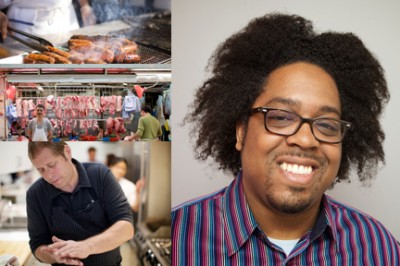We met Clay in the same way that he probably meets many of his future clients: he walked up and introduced himself with a friendly smile. It was already hard not to notice the tall guy with the taller hair carrying a giant camera as if it were weightless. But if he hadn't been so good at making introductions, we might not have made the connection. Which is exactly why we believe his advice about how to make it as a freelancer. For a behind-the-scenes view of restaurant kitchens and more, check out his portfolio and his current Food/Work project.
When did you know that you wanted to work in food?
I was photographing and blogging about food from 2006, but didn't have much in the way of focus. It wasn't until I went to one of Tom Mylan's early butchering classes at The Brooklyn Kitchen in 2008 that I discovered what I really love shooting. Watching Tom turn a pig into food was huge for me. As a home cook and a photographer, I discovered an entire new world. I wanted to see and shoot everything that happened behind the scenes - in kitchens and butcher shops and markets.
From there, I started asking butchers to let me photograph them, then I took my camera with me to restaurants with open kitchens, then I was shooting food events and meeting people in the industry who would let me photograph their process. I eventually turned this into a long-term project called Food/Work, which documents the people and the process that goes into getting food to our tables.
How did you get your current good food job?
I'm a freelancer, so I'm perpetually looking for the next good food job. Mostly, it involves getting in front of people as much as possible, whether it's going to events, shooting personal projects or pitching ideas to potential subjects and clients.
How did your previous work or life experience prepare you for a Good Food Job?
In another life, I was an IT guy. In that field, you can either spend all your time putting out fires or you can observe what people do and proactively offer solutions. I like to watch and understand what's happening around me, so I do it in the kitchen, too. More often than not, my subject isn't so much the food as much as the work that goes into it. Cutting, cooking, plating, there's so much that happens and I find it fascinating.
What was the greatest obstacle you had to overcome in pursuing your Good Food Job dream?
The biggest problem for any photographer right now is the idea that anyone can take a picture and it's all the same. I come across a lot of people that think that an intern with an iPhone can do the same thing as someone who has put real time into honing their skills. It's frustrating, especially in an industry that places such a high value on craftsmanship and technique.
Still, there are many people who understand that while anyone can take a snapshot, a great photograph is something else entirely and it should be valued.
If you could be compensated for your work with something other than money, what would it be?
Travel. The hardest part of moving from the corporate world to self-employment is the constraints it's put on my travel schedule. There are cities all over the world I want to explore. My hope is to find more clients interested in food and kitchen photography beyond the New York area.









